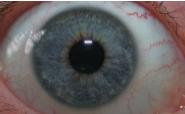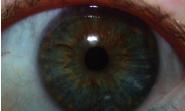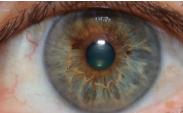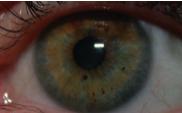Iridology and the Cancer Patient
Jackie Day (ND, MH, MRNI, FGNI. MAMH, MWNMS) is Information Officer for The Guild of Naturopathic Iridologists and Information Officer for The General Naturopathic Council. She has her own practice and is also a tutor in complementary therapies for The Kevala Centre, based in Torquay, Devon.
You’ve had a diagnosis of cancer; so do you need any more bad news? Obviously not; but even a diagnosis of cancer, or any other disease, may not actually give you the full picture. Are there other biochemical events going on in your body that could potentially inhibit your best efforts to bring about improvements? How could you find out what they might be and when you have all this information, what can you do about them and with what likely success?
Questions, questions, questions!
Let’s start at the beginning: What other problems might there be? Well, the body works as an integrated whole, not as a set of individual organs and tissues with each one doing its own thing. Rather, the efficiency of each one will be dependent on the others. Examples of this include the effect that prolonged stress has on the body, progressively depleting immune function. Another example would be inefficient kidney function that could result in hypertension (raised blood pressure). Unless the underlying kidney function is improved, the circulatory system will always be under pressure.
From these examples you will appreciate the importance of a holistic approach to health, looking at the various pathways for failure, not just concentrating on a single aspect. When treating disorders the truly holistic approach would be to take on the role of a detective, looking for clues as to the root causes. So, do you go along to your GP or Oncologist to ask for extensive tests, and doubtless be laughed out of the surgery, if he had time and finances to even care? No, there has to be an easier answer and that is to consult a professional Iridologist. When it comes to the analysis of health matters, Iridologists have a distinct advantage; from the iris of the eye a trained Iridologist can clearly see signs that suggest weakness, toxicity, congestion or irritation in every organs and all the systems of the body. With this information the Iridologist can then quickly determine the pathways to disease, enabling the root causes of the problem to be considered and not just the symptoms.
What exactly is Iridology?
 It’s the study of the irides (the plural of iris) of the eye i.e. the exposed nerve endings that make up the coloured part of the eye. These nerve endings originate in specific organs or systems and are connected to the brain. (A detailed explanation of the way effects in organs could be detected in the nerve endings was given in icon Volume 2 2006.) Similar to Reflexology where the practitioner can feel the abnormalities of the reflex nerve endings by examining the feet or hands, a trained Iridologist can instantly see a veritable Ordinance Survey map of these endings, exposing genetic inheritance, congestive and irritative zones and their various inter-connections and inter-actions within the bodily systems. In the hands of those who are well versed in the pathology of the pathways of disease, as well as Anatomy and Physiology, this provides a veritable microchip of information.
It’s the study of the irides (the plural of iris) of the eye i.e. the exposed nerve endings that make up the coloured part of the eye. These nerve endings originate in specific organs or systems and are connected to the brain. (A detailed explanation of the way effects in organs could be detected in the nerve endings was given in icon Volume 2 2006.) Similar to Reflexology where the practitioner can feel the abnormalities of the reflex nerve endings by examining the feet or hands, a trained Iridologist can instantly see a veritable Ordinance Survey map of these endings, exposing genetic inheritance, congestive and irritative zones and their various inter-connections and inter-actions within the bodily systems. In the hands of those who are well versed in the pathology of the pathways of disease, as well as Anatomy and Physiology, this provides a veritable microchip of information.
Does it work and is it accurate? The answer to both questions is an emphatic ‘yes’. Extensive research trials have been carried out in a number of countries, in one case using over 800,000 people.There is plenty of factual, scientifically based evidence.
Where does it get you though?
Well, as Iridology compliments other therapeutic sciences and provides such thorough and vital information, errors of diagnosis and treatment can be avoided. One thing Iridologists don’t do is ‘diagnose’ i.e. put a clinical name to a symptom: Firstly, it’s illegal to do so and secondly, the iris indicates the relative condition of various parts of the body i.e. their state of health or deterioration, which isn’t the same as a particular marking in the iris being specific to a given disorder. Interpretation is still a factor.
 When most people look in a mirror they see the iris as a solid colour but under the magnification used by Iridologists the thousands of individual fibres are clearly visible. Some people are aware of a variety of colourings, or maybe markings, in their irides. Which brings us to the question, is there any real point going along to an Iridologist? Couldn’t you find all the information you need in a book? Well, you certainly could just use a book if your sole purpose is to achieve no more than becoming a complete hyperchondriac. The skill of an Iridologist is in interpreting the relevance of the iris markings in relation to the individual client and that can only be achieved in conjunction with accurate and sensitive case history taking.
When most people look in a mirror they see the iris as a solid colour but under the magnification used by Iridologists the thousands of individual fibres are clearly visible. Some people are aware of a variety of colourings, or maybe markings, in their irides. Which brings us to the question, is there any real point going along to an Iridologist? Couldn’t you find all the information you need in a book? Well, you certainly could just use a book if your sole purpose is to achieve no more than becoming a complete hyperchondriac. The skill of an Iridologist is in interpreting the relevance of the iris markings in relation to the individual client and that can only be achieved in conjunction with accurate and sensitive case history taking.
What sort of things might an Iridologist be able to determine. First and foremost there’s the genetic constitution of the client, which will have its own inherent tendencies. A trained Iridologist might identify around thirty different constitutions, varying in complexity, stemming from three basic constitutions that we call Lymphatic, Haematogenic and Biliary. As you might guess from its name, people having a Lymphatic constitution may be predisposed to disorders of that system of the body that are associated with poor lymphatic flow and drainage. These could include: low immunity, catarrh, swollen glands, coughs or skin problems. Again, as the ‘haem’ in the name suggests, Haematogenics, while also being predisposed to poor lymphatic drainage, may be more inclined to disorders of the blood that are due to a lack of vital catalysts such as iodine or copper; this could result in problems such as anaemia or endocrine gland disorders. One of the most common problems affecting Haematogenics though relates to the digestive system, with inadequate digestive chemistry causing problems such as constipation, dyspepsia, flatulence, liver or pancreatic malfunctions. The Biliary person will have inherited characteristics of both the Lymphatic and Haematogenic constitutions. Having identified ‘bad’ constitutional traits, it needs to be said that each constitution also has its own specific strengths.
 Apart from constitutional traits, an Iridologist will identify the significance of various markings or colourings that may be present in the iris. Again, the majority of such markings will be inherent features and their relevance to the current health status of a client will be determined via the case history. One such marking on any specific organ or system, known as a ‘lacuna’, may inhibit the flow of nutrients into those tissues, as well as the removal of waste. As an example, a lacuna in the area of a kidney may inhibit efficient elimination of waste via the urinary system. Ideally the body needs all four of its eliminatory organs to function efficiently i.e. skin, lungs, bowels and kidneys. If any one underfunctions, there is an added burden on the others so, in this case, poor elimination via the kidneys may result in skin disorders as that organ struggles to eliminate excess waste products. The lungs may ultimately be affected and a typical scenario could be low oxygen levels in the bloodstream - we know that cancerous cells thrive in an anaerobic (low oxygen) environment!
Apart from constitutional traits, an Iridologist will identify the significance of various markings or colourings that may be present in the iris. Again, the majority of such markings will be inherent features and their relevance to the current health status of a client will be determined via the case history. One such marking on any specific organ or system, known as a ‘lacuna’, may inhibit the flow of nutrients into those tissues, as well as the removal of waste. As an example, a lacuna in the area of a kidney may inhibit efficient elimination of waste via the urinary system. Ideally the body needs all four of its eliminatory organs to function efficiently i.e. skin, lungs, bowels and kidneys. If any one underfunctions, there is an added burden on the others so, in this case, poor elimination via the kidneys may result in skin disorders as that organ struggles to eliminate excess waste products. The lungs may ultimately be affected and a typical scenario could be low oxygen levels in the bloodstream - we know that cancerous cells thrive in an anaerobic (low oxygen) environment!
Does it mean that everyone with say a Lymphatic constitution will have any or all of those disorders? No, absolutely not – they are simply predispositions and they will generally need a trigger. Given a diet and lifestyle appropriate for the individual, he or she may never experience anything more than the average cold. If things start to go wrong though, the constitutional aspects may indeed to the contributory factor and will need to be addressed.
From the above, if you have just a basic knowledge of Anatomy and Physiology, you can probably start to see certain of the pathways to disease. If we take the Haematogenic digestive weaknesses, we start with poor breakdown of food in the stomach and intestines, progress to constipation, then to toxicity of the liver and pancreas and finish up with a condition known as ‘autointoxication’ – literally ‘self poisoning’.
 Autointoxication is a problem; more correctly it should be described as a cause of problems. From a naturopathic viewpoint, the bowel may play a role in the development of various diseases and digestive dysfunction may be related to virtually all chronic and degenerative conditions. But I hear you saying “Surely all those coffee enemas will have cleared out the waste from the digestive tract”. Well, yes and no; enemas do offset one of the major ageing and poisoning processes in the body. Depending on the strength and condition of the intestines, we are all susceptible to the absorption of toxins as well as nutrients. However, to ensure that as little waste as possible from digestion gets into the bloodstream, we need good bowel muscle tone, effective peristalsis, frequent bowel movements and well-balanced bowel flora. Enemas can remove waste from the large intestine but if there has been a history of sluggish bowel movements, varying degrees of waste will have built-up and become impacted on the walls of not just the large intestine but also the small intestine.
Autointoxication is a problem; more correctly it should be described as a cause of problems. From a naturopathic viewpoint, the bowel may play a role in the development of various diseases and digestive dysfunction may be related to virtually all chronic and degenerative conditions. But I hear you saying “Surely all those coffee enemas will have cleared out the waste from the digestive tract”. Well, yes and no; enemas do offset one of the major ageing and poisoning processes in the body. Depending on the strength and condition of the intestines, we are all susceptible to the absorption of toxins as well as nutrients. However, to ensure that as little waste as possible from digestion gets into the bloodstream, we need good bowel muscle tone, effective peristalsis, frequent bowel movements and well-balanced bowel flora. Enemas can remove waste from the large intestine but if there has been a history of sluggish bowel movements, varying degrees of waste will have built-up and become impacted on the walls of not just the large intestine but also the small intestine.
To many people, the chief aim of the intestines appears to be to defy all attempts at achieving regular bowel movements! Let’s stop there and define the word ‘regular’. No, it doesn’t mean regularly having a bowel movement every two or three days, or longer. It means regularly at least once a day, so even if you’re having enemas every day, if you’re not achieving a regular bowel movement, there’s a strong likelihood of autointoxication.
The iris may suggest a state of autointoxication, weak pancreatic enzyme production, an overburdened liver or low hydrochloric acid status of the stomach . Don’t forget the stomach is part of the body’s first line of defence. Adequate hydrochloric acid is needed to destroy invading micro-organisms. Unfortunately, levels of stomach acid tend to decline with age and may result in symptoms that people frequently mistake for over-acidity. Depending on the individual constitution, some people experience low stomach acid production at a relatively early age. Hence, they rush out and buy antacids, potentially the very last thing the body needs, allowing pathogenic organisms to invade the body. Left unchecked, these problems can continue for years, adding to the toxic load on the body.
While a visit to an Iridologist might seem as if it’s going to be bad news all the way, think of it instead as a positive and construction approach that may help individualise your therapeutic approach, rather than follow a regimen suggested for cancer patients in general. Member of The Guild of Naturopathic Iridologists are qualified not just in Iridology but also in at least one therapeutic science – among its members are Naturopaths, Homeopaths, Herbalists, Nutritional Therapists, Chiropractors, Osteopaths etc. For more information on Iridology you can visit the website: www.gni-international.org. If you’d like to contact the Guild the phone number is 0207 7821 0255 or email:info@gni-international.org.
 Jackie Day lives in Devon, is a naturopath, herbalist, nutritional therapist, iridologist and also incorporates other approaches including meridian energy therapy and stress therapy.
Jackie Day lives in Devon, is a naturopath, herbalist, nutritional therapist, iridologist and also incorporates other approaches including meridian energy therapy and stress therapy.
Jackie has a practice in Okehampton and another in Tavistock. All consultations begin with an iris analysis - which quickly points her to which therapeutic approach to take. She has written several courses on various aspects of complementary therapy and is also a tutor for The Kevala Centre, a distance learning college in Torquay. She is the Information Officer for The Guild of Naturopathic Iridolgists and for The General Naturopathic Council.